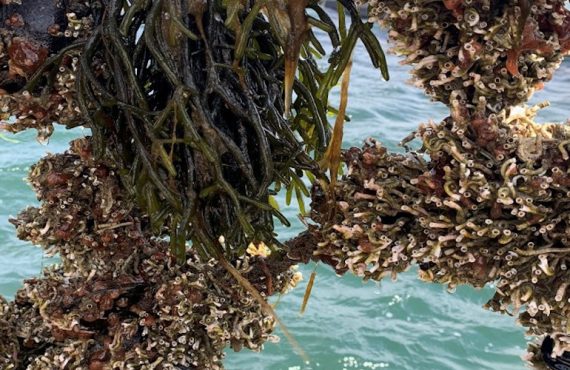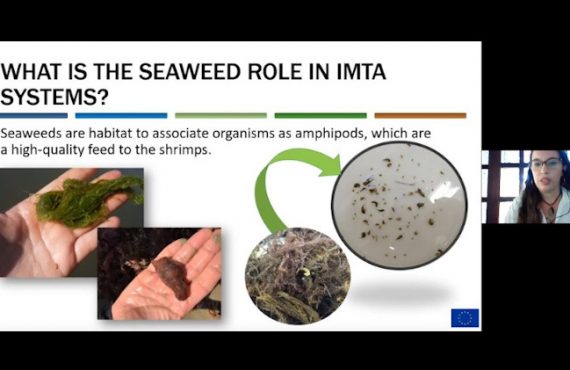AUTHORS: Danielsen, Eirikur; á Norði, Gunnvør SUMMARY: Blue mussel farming is currently not an industry in the Faroe Islands. However, they are abundant in the coastal waters around the islands and previous trials have shown a good farming potential. Blue mussels are a low trophic species that show a great potential to increase
AUTHORS:Camille Saurel, Clarie Ng, Pascal Barreau, Iarfhlaith Connellan, Colin Hannon, Adam Hughes, Pernille Nielsen SUMMARYMytilus edulis, commonly known as the blue mussel, is the second most economically important mussel cultivated in Europe. Faced with increasing spatial limitations inshore, researchers and industry are looking at distant offshore sites for longline cultivation with
This report was developed as a learning material for use in the AquaVitae MOOC (Massive Open Online Course) developed by the project during 2021-2022. The report presents the concept of low trophic species, discusses some of the most commonly used classification systems for culture systems (open/closed systems and intensive/extensive systems),
Åsa Strand, Anton Rydstedt, Erik Lindblom have recently published a report on Environmental Monitoring, Risk Assessment and Sustainability in AquaVitae. SUMMARY This report aims to provide a common framework for the AquaVitae sustainability and risk assessments, by mapping existing and emerging Low Trophic Sustainable (LTS) aquaculture. To be included, the LTS-system must
Before summertime break there is a last webinar to enjoy! Sebastiaan Wensveen is originally from the Netherlands but he is doing his master’s degree in Sweden at University of Gothenburg. As part of his master thesis, he has worked on flat oyster aquaculture in Ireland and Sweden in the hopes of
AquaVitae training activities includes exchanges abroad for the students. Last summer Mayleen Schlund took part in one of them. She travelled to Faroe Islands where she made an internship in the research station Fiskaaling. The student exchange within the project framework allows the participants to expand their international networks and
The student section of the AquaVitae participated in the General Assembly 2022 in Porto, Portugal. They shared their experiences in the aquaculture industry and other apprentice exchanges. Stef Claessens, Abigail John, Stefany Almeida Pereira, Gerardo Díaz and Mayleen Schlund are passionate about the ocean and the sustainability. Their studies lead them
AquaVitae develops different training activities that provide the knowledge needed to bring the low-trophic aquaculture production to a wider audience ensuring sustainable food production and mitigation of the climate crisis. Among these activities, we can pinpoint the student exchange, our monthly webinars and, of course, the massive open online course
Andressa Cristina Ramaglia da Mota graduated in Marine Biology in 2015 and proceeded to specialize in aquaculture. She has always been interested in how climate change and pollutions affect the marine organisms and has developed various studies on the topic in her academic career. One of them concerns how ocean
We bid farewell to 2021 with a new chapter of a Low Trophic Life webinar focused on the possibility to feed abalone with macroalgae in an IMTA system. As part of AquaVitae project, Ben Opara delivered his master’s thesis in Marine Biotechnology earlier this year at UiT The Arctic University
Arapaima gigas is one of the world’s largest freshwater fish. It is a promising candidate for freshwater aquaculture development in Brazil due to its high growth rate and meat quality. But the lack of reproductive control in captivity has limited the expansion of Arapaima farming. Can
Low Trophic Life Webinar: “Enhancing oyster production with artificial intelligence & new protocols”
The hurdles facing the oyster industry in Scandinavia are mainly related to the occurrence of multiple oyster species in the sea (of which only one is desired for production) and the need for suitable collectors for small scale, emerging industries. AquaVitae aims to help the industry tackle these hurdles. In
PhD student Emmanuel Falade has worked with Wild Coast Abalone, the 3rd largest abalone farm in South Africa and AquaVitae partner, to optimise the co-production of abalone and macroalgae in integrated multi-trophic aquaculture (IMTA) systems. In this live webinar, he gave an insight into some preliminary
Photos in collage by Kristina Svedberg, and submarine mussel lines by Daniel Taylor, DTU. How many mussels can you spot in the photo? Fouling is what hides them: all the species that latch to any surface in the ocean, including the (hidden) mussels in the image. As
AquaVitae case study on “Offshore macroalgae cultivation” celebrated a stakeholder workshop with the objective of: technically demonstrate offshore and sustainable seaweed cultivation by optimised logistics,re-use of aquaculture equipment,optimal site selection,development of bio-secure storage methods for seaweed to use as feed for abalone. The event took place on February 10th from 13:00 to
A new chapter of the Low Trophic Life series focused on the life-cycle assessment (LCA) of low-trophic species aquaculture. Jean-Baptiste Thomas is a postdoc at KTH in Sweden. He presented a life cycle assessment of low trophic species in aquaculture, with a particular focus on seaweed. His
AquaVitae series Low Trophic Life second webinar was focused on experiments on IMTA carried out at UFSC combining seaweed, mullet, and shrimp cultivation in biofloc system – an IMTA approach. The recording of the webinar contains presentations by Esmeralda Chamorro and Mateus Martins. Chamorro presented the results
The first webinar in the AquaVitae series Low Trophic Life, “Seaweeds as key components in pond IMTA systems” took place on 26 November from 14:00-14:30 CET. Stefany Almeida Pereira is a marine biologist at Universidade Estadual Paulista (Unesp) and with a master in aquaculture at the
An introduction to AquaVitae work and contributions to both Galway and Belèm Statements was part of a workshop by the Atlantic Ocean Research Alliance (AORA) held in Iceland on the 22- 24 October. Download File: [AquaVitae_AORA_ Workshop_19]
Philip James, project coordinator, presented AquaVitae’s ambitions and expected outcomes in the EU EATIP Day at Aquaculture Europe, joining representatives of the European Commission, EATIP and sectoral stakeholders. The session was focused on new aquaculture value chains, especially those that include species from the lowest levels









